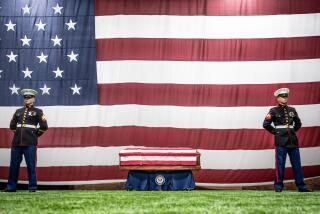8 Troops Killed by Suicide Bomber; 2 Other Soldiers Die
- Share via
BAGHDAD — The number of U.S. troops killed in Iraq during the bloodiest month since the U.S. invasion last year continued to swell Thursday, when at least 10 more soldiers were reported dead -- eight of them victims of a car bomb south of the capital.
The 10 deaths brought to at least 125 the number of service personnel killed in action this month, according to unofficial figures. The toll far outstrips the approximately 110 killed in fighting during the three-week push to Baghdad last spring. About 735 U.S. troops have died since the invasion.
The car bombing, which took place on a rural road south of Baghdad, was believed to have caused the highest number of U.S. fatalities from a suicide attack in Iraq. Suicide car bombs have killed hundreds, but most victims have been Iraqi civilians or police officers.
The eight soldiers killed and four wounded in the attack were with the Army’s 1st Armored Division, working to remove roadside bombs about 18 miles from the capital, the military said. Such bombs -- a favorite weapon of insurgents in Iraq -- have killed many U.S. troops and Iraqi civilians and have severely disrupted supply convoys.
The latest American victim of a roadside bomb was a 1st Infantry Division soldier killed Thursday in Baqubah, northeast of Baghdad. Another soldier was injured and was listed in stable condition.
The 10th fatality occurred during a patrol in Baghdad.
Residents of the farming area near the town of Mahmudiya, where Thursday’s suicide attack occurred, indicated that U.S. forces were overseeing repairs on a road often used by military convoys. The military has embarked on an ambitious road repair program to improve routes used by convoys. Bombs and heavy traffic have left many of Iraq’s major routes barely usable.
U.S. commanders are on continuous alert for suicide attacks.
Checkpoints and base entrances are heavily barricaded to prevent suicide attackers’ vehicles from crashing into them. Gunners protecting convoys eye all traffic warily and often do not permit civilian vehicles to approach. Motorists have been warned that lethal force could be employed against unauthorized traffic traveling on routes reserved for convoys.
U.S. officials said a driver in a station wagon approached troops working on the road project about 11:30 a.m. “Once he was close enough to inflict injury, he detonated the explosive device,” the military said in a statement.
Witnesses reported hearing a loud explosion and seeing smoke. Later, they saw helicopters evacuating the wounded and dead and a destroyed Humvee being carted away on a flatbed truck.
U.S. tanks and troops blocked access to the road where the explosion occurred.
The 10th fatality was a 1st Cavalry Division soldier who was the victim of a rocket-propelled grenade attack in Sadr City, a sprawling neighborhood in eastern Baghdad that is a stronghold of Muqtada Sadr, a militantly anti-occupation cleric whom U.S. authorities have vowed to kill or capture.
U.S. troops often face ambushes in Sadr City. The cleric himself is holed up in the Shiite Muslim holy city of Najaf, south of the capital, where more than 2,000 U.S. troops are stationed.
Special correspondent Suheil Ahmed in Yousifiya, Iraq, contributed to this report.
More to Read
Sign up for Essential California
The most important California stories and recommendations in your inbox every morning.
You may occasionally receive promotional content from the Los Angeles Times.













